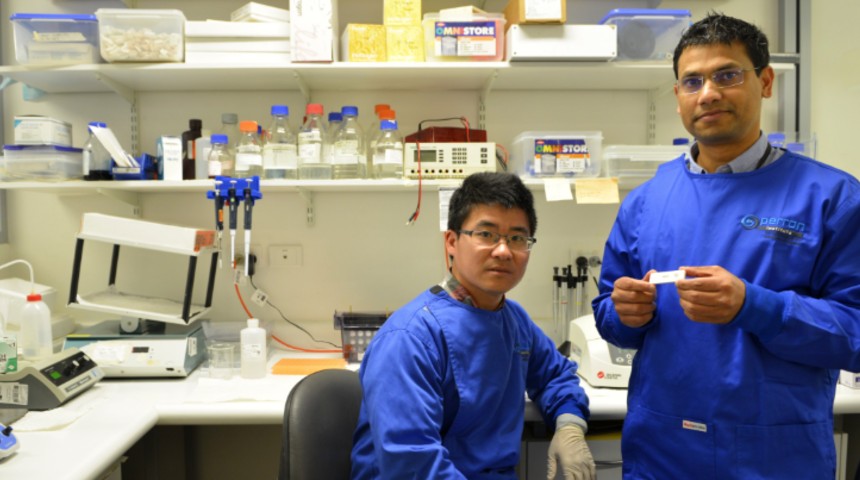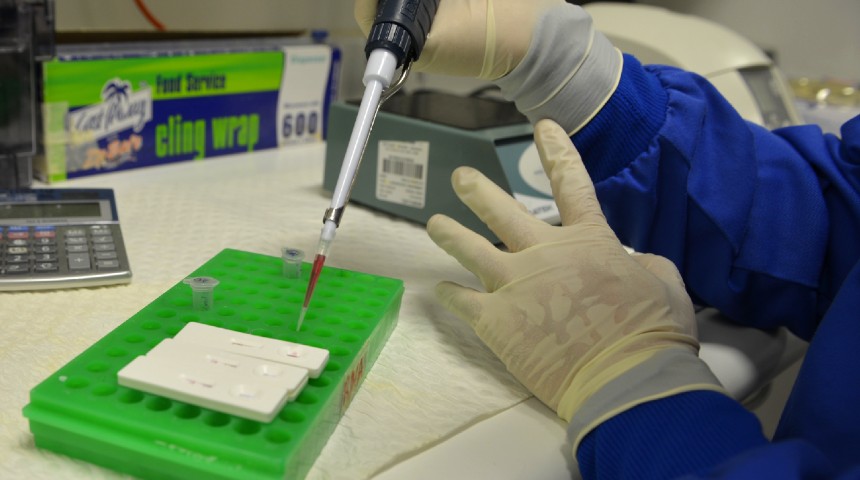
New research at Murdoch University and Perron Institute is set to develop a faster and more accurate, paper-based COVID-19 testing method to deliver accurate results in minutes.
The research initiative will be funded by the Department of Health and WA Health Translation Network COVID-19 Research Grants Program.Head of Nucleic Acid Therapeutics Research at the Centre for Molecular Medicine and Innovative Therapeutics (CMMIT) at Murdoch University and Perron Institute Associate Professor Rakesh Veedu is leading the program as one of the few researchers awarded funding out of a $1.9 million pool.
Associate Professor Veedu said the project aims to develop a high-sensitivity detection test, using a novel molecular plug (called ‘aptamer’) that will identify the presence of the SARS-CoV-2 virus, potentially at infectious levels.
“This would bypass the current antibody testing technique, which identifies whether the individual tested has had an immune response to SARS-CoV-2, but cannot indicate if an individual is infectious and likely to transmit the virus.”
Part of the CMMIT-led research initiative will also evaluate the scope of the aptamer being used as a drug molecule towards the treatment of COVID-19.
“The spike protein-specific aptamers developed in this project hold promise for a novel anti-COVID-19 treatment. They play an important role in virus or host cell recognition, so there is tremendous opportunity to develop new anti-COVID-19 therapeutics including a throat spray to potentially treat COVID-19 patients as well.”

Associate Professor Veedu said the key to controlling COVID-19 is to stop virus transmission by precisely identifying and isolating virus carriers in society, which puts high demand on high-throughput and accurate virus detection techniques.
“There is no doubt that current testing measures represent the gold standard for COVID-19 detection. However, it requires sophisticated facilities, highly trained personnel and prolonged time for analysis that limit its application for large scale screening, especially in under-resourced areas.”
“The accuracy is already compromised by the fact that antibodies initiated by the virus take four to 14 days to develop. And, unfortunately, there are many patients who do not have detectable antibodies even weeks after infection and a (up to) 30% false negative rate.
We’re hoping our research, and new testing method, will help to reduce the public health risk by identifying infectious patients sooner and eliminating the threat of unwanted community transmission.”
Associate Professor Veedu added the CMMIT will partner with clinician researchers at Fiona Stanley Hospital to evaluate the efficacy of the developed aptamer test strips alongside current approaches.
“Our paper-based test is estimated to cost ~ AU$8/test, which is much lower than the current antibody-test strips (~ US $400/30 tests, AU$21/test.”
The team are aiming to make the test available in nine months. Associate Professor Veedu attributes the project to be a direct result of ongoing discussions between researchers at the CMMIT (Dr Tao Wang and Professor Sue Fletcher), the Clinical Research Head of South Metropolitan Health Service, and Practicing Clinicians at Fiona Stanley Hospital (Professor Merrilee Needham and Dr Warren Pavey), as well as Dr Ann Choong from The Centre for Entrepreneurial Research and Innovation.